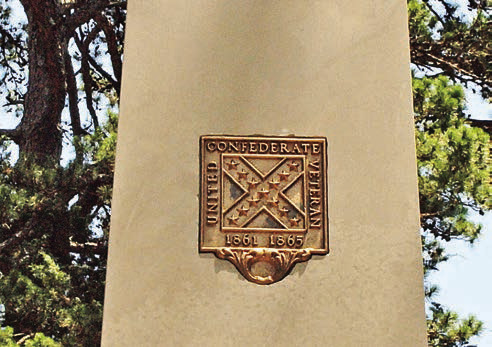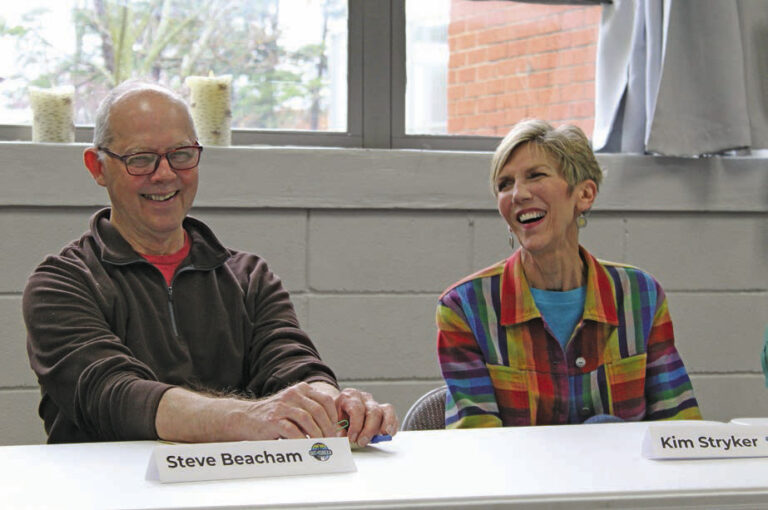Despite a recent call from a city councilman for members of the Eureka Springs Cemetery Commission to resign, commissioners took no action other than voicing their opinions regarding a controversial topic at their June 14 regular meeting.
Council member Harry Meyer told a regional radio program that he would like to see cemetery commission members step down after the recent discovery of a 15-foot tall obelisk honoring Confederate soldiers that was allowed to be erected at the city cemetery.
“All I can say is I would love to have our cemetery commission just resign over this,” Meyer said on Ozarks at Large, a weekday program and podcast on Fayetteville-based National Public Radio station KUAF. The report added that Meyer said the commission “should have blocked installation of what he describes as a monument to white supremacy in their town burial ground.”
The radio piece, which is available online, was done by reporter Jacqueline Froelich, and included comments from Meyer, Eureka Springs Mayor Butch Berry and former cemetery groundskeeper and sexton Patrick Lujan.
The obelisk, a stone pillar typically set up as a monument or landmark, was built on a lot purchased by Carroll County resident Koltin Massie for $1,000, according to Froelich’s report.
Cemetery commission chair L.B. Wilson and commission member Bruce Wright, a recent cemetery superintendent, declined to be interviewed for Froelich’s story, she reported.
Wilson, however, did read a statement at the June 14 meeting, stating his personal opposition to the monument but saying that all rules that currently exist for the cemetery were followed.
“I’ve been bombarded by people wanting public comments,” Wilson said in a recording of the cemetery commission meeting.
“I wish I had page by page complete policy manual but I’ve pieced together some things. …. After reviewing all the information pertaining to the Confederate monument project I have concluded that the initial purchase of the burial plot by Koltin Massie … all cemetery guidelines, rules and policies has been applied and followed.
“In other words, the Confederate monument project is in compliance with cemetery commission policy.”
Wilson’s statement included that Wright, a member of the commission, was part of the approval process and monitored part of the installation of the obelisk.
“This was maneuvered in a way” to meet the commission’s policy, Wilson said.
Massie serves as commander of the Sons of Confederate Veterans, Seaborn Jones Cotten Camp in Eureka Springs, named after his fourth great-grandfather, who fought for the Confederacy, Froelich said in her report, adding that Massie declined to be interviewed.
Massie did send several emails to Froelich explaining that the monument “is dedicated to the 75 known Confederate men and boys that died during the Civil War, among an estimated 200 Carroll County Confederates who perished.”
“Massie says the monument serves as a final grave marker, giving descendants of Carroll County Confederates a place to visit and lay flowers to remember their ancestors,” Froelich reported.
A press release was posted on the Seaborn Jones Cotten No. 2303 Facebook page on Tuesday, June 20, explaining the group’s position on the subject.
“It seems necessary to create context to the Eureka Springs ‘Confederate monument’ as between the Eureka Springs rumor mill, the news media and a Eureka Springs City Council member misinformation has ran rampant,” the post reads. “Let us be clear! The is a monument to Confederate soldiers who died while serving from Carroll County, Arkansas. This is also a monument to commemorate civilians and even Union Soldiers who served from Carroll County that perished in the 1861-1865 conflict. If remembering the dead that died in this county during the American Civil War is wrong. We proudly will continue to be wrong. This is a Civil War tragedy monument that will also bare the names of Confederate Soldiers in the Eureka Springs Cemetery.
“This is not a monument to celebrate, to parade around and shout hurrah for a new Confederate monument. It is a memorial marker. Lay flowers, and place a Civil War period flag. Be respectful this is for the hundreds of men and boys who never came home.”
Massie didn’t respond to an email from the Eureka Springs Times-Echo, but told the Northwest Arkansas Democrat-Gazette that plaques with the names of fallen soldiers are planned for the sides of the monument, which will push the cost of the project to $20,000 to $25,000.
At the June 14 meeting of the cemetery commission, commissioners voiced opposition to having a monument honoring people who aren’t buried at the Eureka Springs Cemetery.
“This place was founded to help the poor bury their dead,” a commissioner — apparently David Danvers — said at the June 14 meeting. “Myself, as a commissioner, I am not in favor of any monument project out here. This spirit of a cemetery is about internment, bodies, ashes, whatever. It is not by activism.”
Danvers said he visited cemeteries in Alpena and Berryville to see if they had something similar to the monument in Eureka Springs.
“There’s not a monument in any of the cemeteries and I don’t want there to be a monument in Eureka Springs Cemetery and I want that known,” he said. “I want that known. This is for the internment of bodies and not to make a statement or anything … it goes against what we are doing as a cemetery. We are not a memorial park.
“I want my voice heard for the record that I will do anything in my power to prevent a Confederate memorial project from occurring in that spot. I will do everything I can for that or any other monument.”
Later, Danvers said: “If there’s any way I have the power to overturn that Confederate monument I’m going to voice it and do it.”
Meyer told Froelich that the gray limestone monument, with a base cost of $10,000, was installed in the public cemetery without notice.
“Confederate monuments have been coming down all over the United States in public places and my goodness, we have one here now,” Meyer said in the report. “It is absurd. It is an insult.”
Cemetery commissioner Glenna Booth questioned Wright about plans that were approved for the monument during the June 14 meeting.
“This is not a little gravestone for grandma,” Booth said.
There are more than 4,500 graves in the cemetery and 96 contain remains of Civil War veterans, both Union and Confederate, according to the KUAF report.
Blake Gary, an attorney with the Arkansas Municipal League, said in Froelich’s report that Arkansas’ public cemetery code deals mainly with “disposal of the dead, leaving regulatory oversight to cities and towns.”
“If it is his individual plot, then I’d have a hard time arguing that he doesn’t have a right to put something in there … regardless of what the speech looks like,” Gary said in the report.
In fact, Act 1003 was passed by the Arkansas Legislature in 2021 and states that “a historical monument shall not be relocated, altered, renamed, rededicated or otherwise disturbed.” In certain circumstances, waivers may be requested by state, county or local government entities, but only on monuments that are on public property.
Massie’s obelisk is on privately deeded cemetery property, according to Froelich’s report.
“In my opinion it is a First Amendment right of freedom,” commissioner Robert Tollett said at the June 14 meeting. “You buy a plot, it’s a private piece of property and what you do with it as long as it meets cemetery rules. …” Wright confirmed to Ozarks at Large that he had sole authority over monuments and gravestones in the cemetery and oversaw the construction of the obelisk, which Froelich reported is the first to be erected in Arkansas since more than 160 Confederate monuments and memorials have been removed from American public parks and building sites, including five in Arkansas.
Wilson appointed Danvers, Booth and Tollett to a work group to go through cemetery policies and asked them to convene before the July 12 regular cemetery commission meeting to report any suggested changes. Since two or more commissioners will be present at those meetings, they will have to be open to the public and recorded in at least an audio format per the state’s open meeting policy under the Arkansas Freedom of Information Act.


